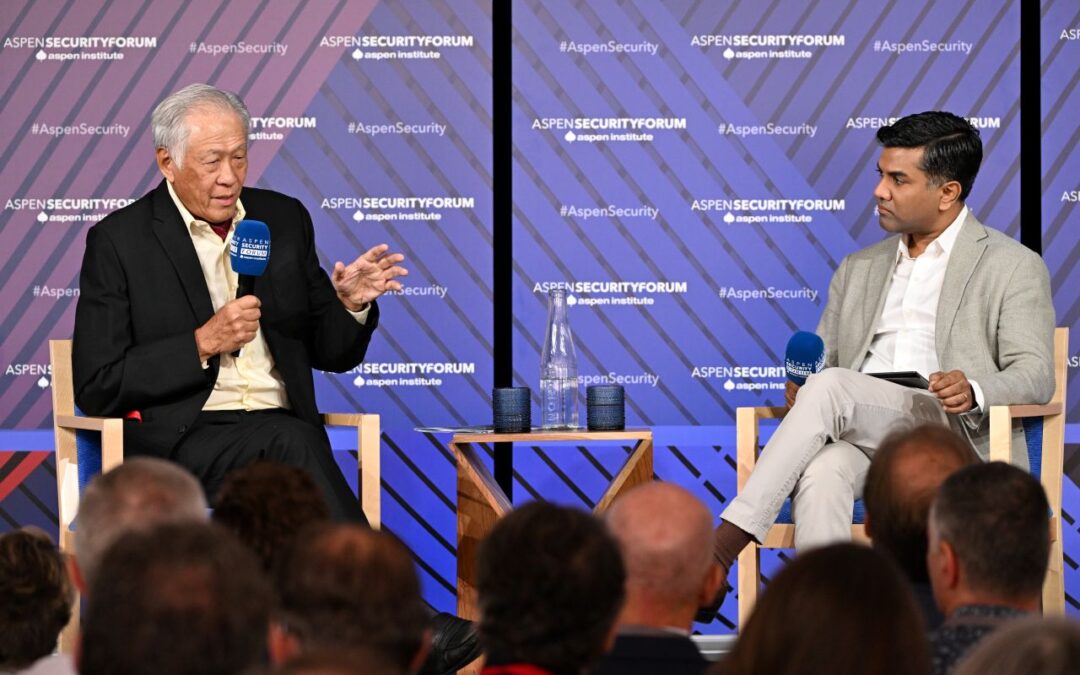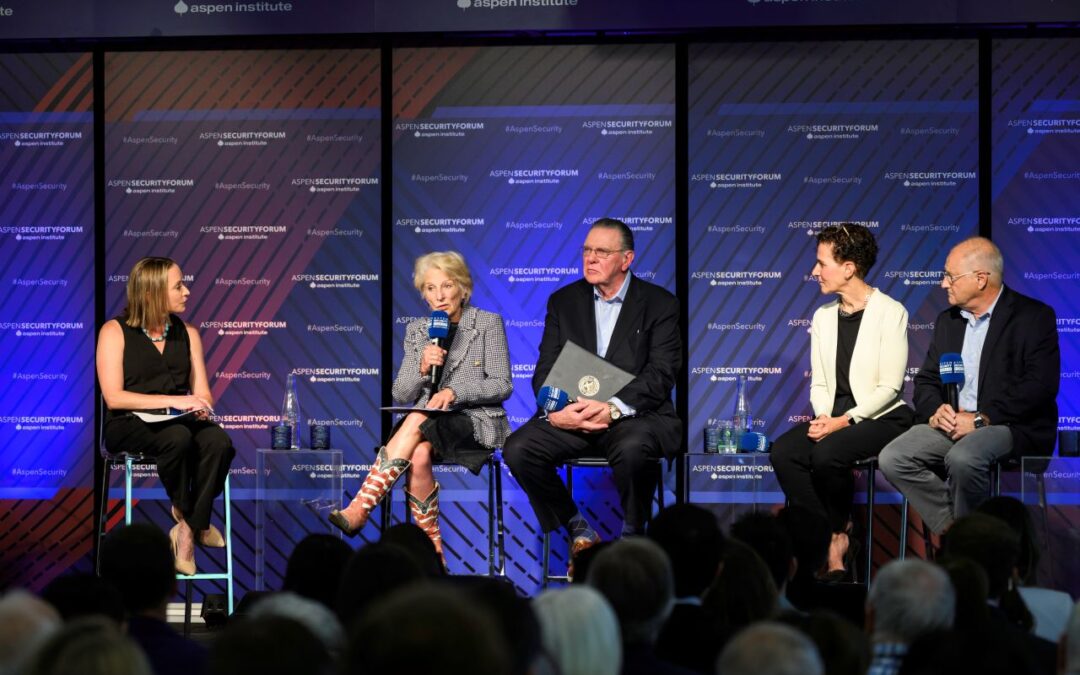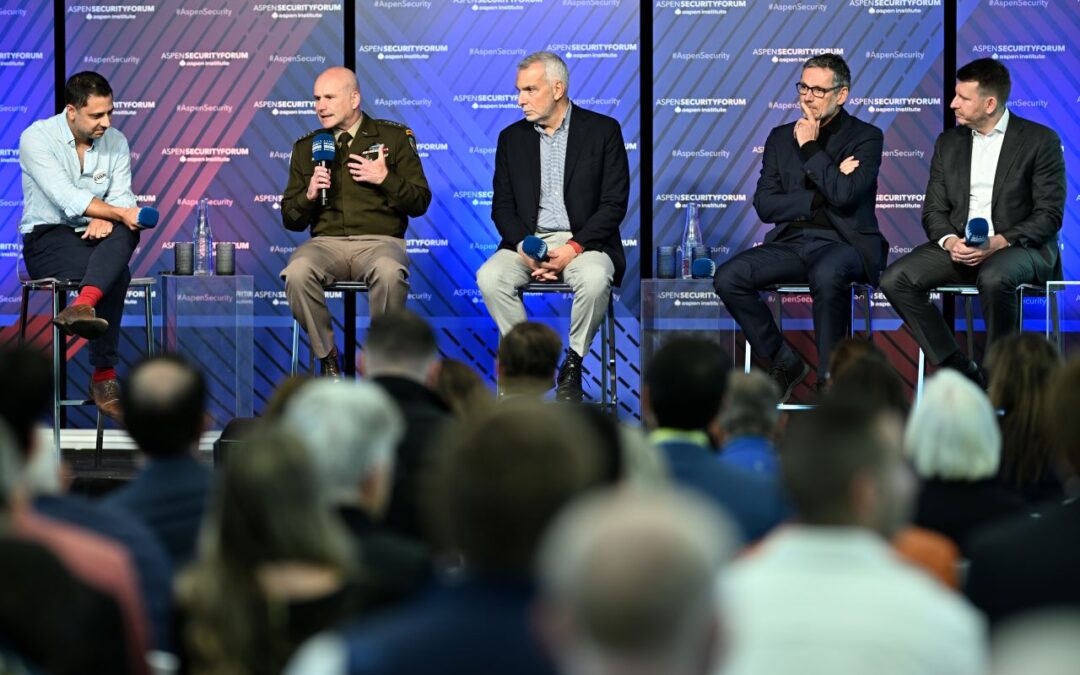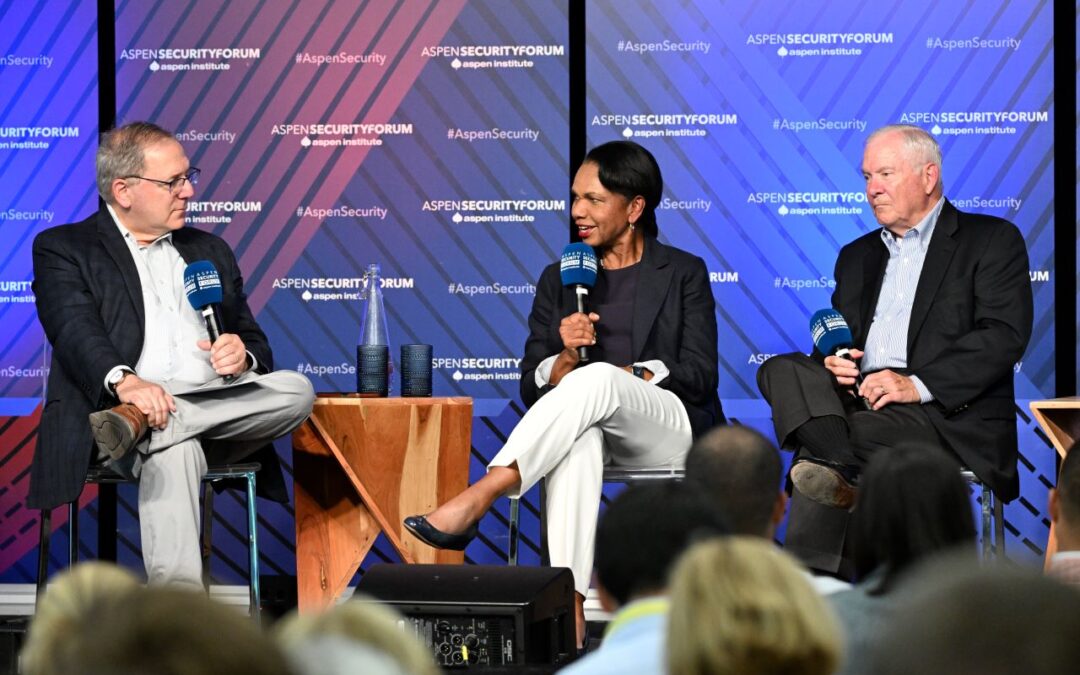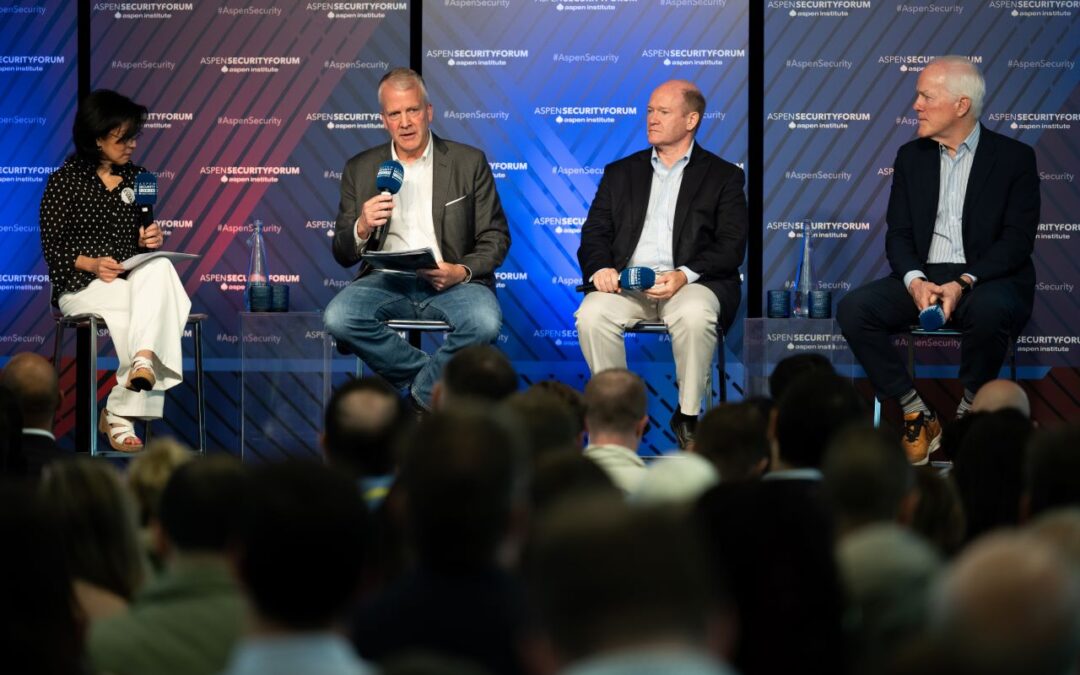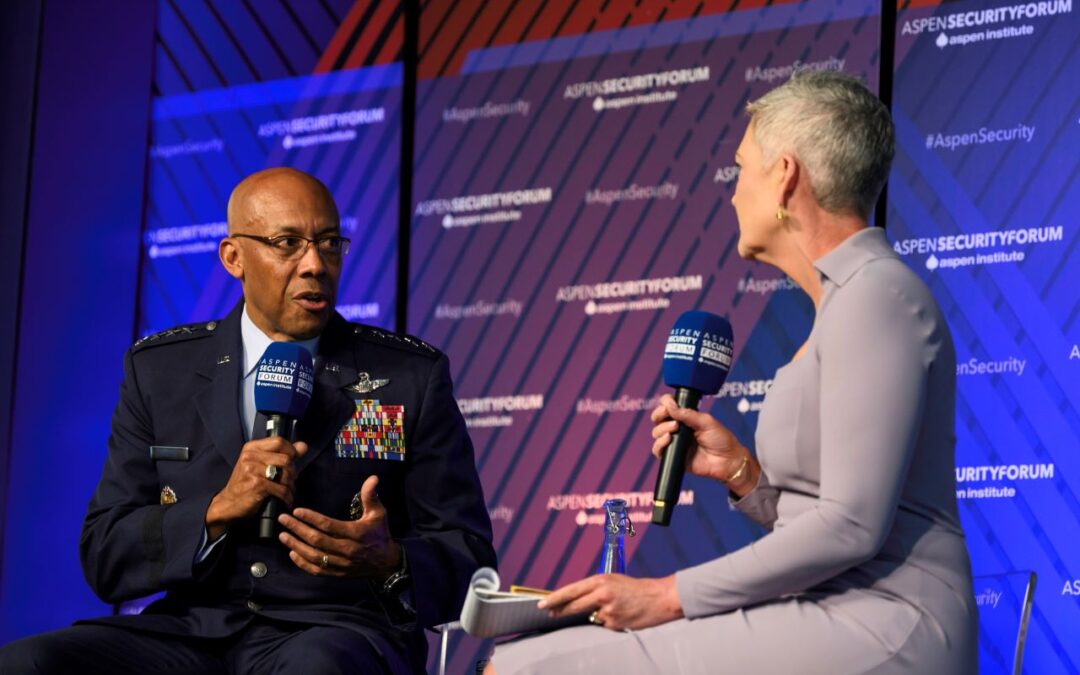Speakers
Xie Feng, Ambassador of the People’s Republic of China to the United States
Moderator: Steve Clemons, Founding Editor at Large, Semafor
Full Transcript
Read the full transcript below or download it to your device.
Click to read the full transcript
Steve Clemons
I’m Steve Clemons of Semafor. Ambassador, it’s great to see you. I’m gonna start out here a little differently. I’m just interested, so I want to pay respect to anyone near or over 100 years old. Anyone? Anyone? We had a, you’re joking. This is a serious matter, because there’s some breaking news because Henry Kissinger was reported to have gone to China. It’s a long trip and the 100 year old diplomat Henry Kissinger is in China, breaking news. We’d love to hear how did his trip go? Has he solved things that America is there any breaking news that you can share with us about solving any of the problems that China the United States have?
Xie Feng
Well, I think it’s a good occasion to pay our respects to Dr. Kissinger again. This year, he is 100 years old and he has not only been a I think he first of all, he is a patriotic American citizen. He cares for American interests. But I think it’s also wise for him to realize that a sound and stable Sino US relations is in the interest not only of China, but also United States. So that is why the first American friend I paid my courtesy to is Dr. Kissinger. I visited his home in, in Hartford, and afterwards, I also hosted a dinner in honor of his centenary, you know birthday. So now he is Beijing and he will be meeting with the Chinese leaders. And I think the message from this visit is that a Sino US relations is so important that we simply cannot let it fail. And that is the responsibility of our two countries to work together to bring this relationship back to the right track.
Steve Clemons
We know he met Wang Yi, we know he met the defense minister who we have not had a lot of meetings with. Any chance he met Qin Gang, the foreign minister?
Xie Feng
Well, let’s wait and see.
Steve Clemons
Any more?
Xie Feng
Yes, there are more. I think there will be other Chinese leaders that will be meeting with Dr. Kissinger.
Steve Clemons
Well, we are interested in in the former foreign minister, well I shouldn’t say former but the previous ambassador, he spoke on the stage last year, Ed Luce interviewed him and just would love to hear how he is and I thoug33:24
ht maybe he was doing secret diplomacy and Henry Kissinger was over engaged with Qin Gang, but that hasn’t come out yet. So if there is if that has happened, I hope you’ll give me the scoop.
Xie Feng
Well, the foreign minister’s spokesmen have already briefed the media on this. So I thank you for your care.
Steve Clemons
Okay. So let me ask you, Ambassador, you’re here. And I’m interested in why given, I mean, US China relations, as you know, is is in a bit of trouble. It’s a portfolio that’s going to require a lot of work. I’m not sure why you wanted to come here. What is your agenda as you see it, as you diagnose US China relations, what’s good, what’s not good from your perspective? And what are you going to try and fix?
Xie Feng
Well this is frankly speaking a difficult time for China US relations. But as a diplomat, I have to follow the instruction of my leaders as far as my government to do the job that is needed to be done. So I came here on the one hand, you know, as the Chinese representative I’m here to safeguard China’s interests, but on the other hand, as the as the representative of the Chinese people, I’m coming here also to enhance communication and cooperation between China and United States and this is also an important mission. Sino US relations is facing serious difficulties and challenges. Recently, since my arrival, I have noticed there have been reflections on the US side on its China policy. In the previous weeks, there have been a series of high level exchanges between China and the United States, they proved to be in depth, candid, and constructive. I think the most important thing out of these visits is that both sides agreed we should implement the important common understanding reached between the two presidents in Bali. I think this is a good sign and this provides a rare opportunity. But the challenges are still abound and the foundations are still fragile. So we need to keep up and also to sustain this good momentum.
Steve Clemons
So you had Secretary of State Blinken, who will be here this week, you had Secretary of Treasury Yellen who will not. We’ve had John Kerry over now we we can’t count him as an official but of course Henry Kissinger, so there’s a stream of people going over, who’s next?
Xie Feng
Well, right now, Kerry, the presidential special envoy is in Beijing and Secretary Raimondo has also expressed a wish to go to China. So we welcome more American officials, as well as people from the business, from students, scholars, even tourists we welcome, we embrace you to visit China.
Steve Clemons
So do you look at Secretary Raimondo, we were just talking to her earlier not to her but about her earlier in a session about chips with the CEO of Intel and the previous Secretary of Commerce, Penny Pritzker. And, and we were talking about a kind of technology war with China and whether we’re in that or not both of them said no, but they said the challenge is very severe. Do you look at Gina Raimondo as an economic official or do you look at her as a national security military official?
Xie Feng
Well that question has to be determined by the US side, not by me. But frankly speaking, China is opposed to any kind of trade war, you know, technological war under the pretext of competition. China do not shy away from competition, but the definition of competition by the US side, I think is not fair. First of all, United States is trying to win by keeping China out. For instance, Huawei was banned, even though this company has come up with an agreement to have no security, to have no backdoor. So how can you imagine a competition without one side, even on the ground? And secondly, I think the United States is rallying allies to encircle China. This is not and before it was the one on one.
Steve Clemons
So you feel encircled?
Xie Feng
Of course, this is the effect. This is the effect. And thirdly, I think United States is restricting or prohibiting China in importing equipments to build chips, you know, which are smaller than 14 nanometers. I think this is like, you know, restricting the other side to wear outdated swimwear in a swimming contest while you yourself is wearing a speedo in a fast skin. So this is not fair.
Steve Clemons
I am I am just for the record very comfortable with outdated swimwear. China however, in response to some of these, you banned micron technologies from your national security architecture, you’ve also restricted export of two metals. Are we at the beginning of an escalatory tit for tat, from your perspective that you’re now sending a signal that you’re not going to take it anymore? And you’re gonna go and begin restricting technologies and materials that the United States needs?
Xie Feng
I see I up to now 1300 More Chinese entities or personnel have been on the US sanctions list. And these people were forced out of a job and their family suffered greatly and we have been, it has been reported that the US side is also considering you know, having a outbound investment review mechanism. As well as the further you know, prohibition on the export of AI chips to China. So these you know, the Chinese people cannot sit cannot, you know, remain silent, and Chinese government cannot simply sit idly by try in Chinese saying there is the Chinese say that we will not, you know, make provocations, but we will not flinch from provocations. So, China, definitely, you know, we’ll make our response but definitely it’s not our hope to have a tit for tat. We don’t want you know, trade war, technological war. We we want to say goodbye to the Iron Curtain as far as the Silicon Curtain.
Steve Clemons
Do you think Americans you’re meeting with are getting that message? You were at the Pentagon recently? I don’t know if you’ve had met Representative Mike Gallagher of the chair of the Select Committee on China. But Are you sensing that that message that you’re sharing with us? Do they believe you?
Xie Feng
Well, I have not met with the representative yet, but I’m trying my best to engage with the American public. The reason why I come here to attend this forum,
Steve Clemons
I think they’re watching by the way. I think the committee is definitely watching.
Xie Feng
Thank you. I would like to express my thanks again to the forum for inviting me, and thank you for talking to me.
Steve Clemons
But in this portfolio, your job and whatever it you know, I reached out and I basically talked to a couple of folks I really respect in the broad foreign policy establishment but I also got a couple of quotes and just read them real quickly, because I think you have a bitch of a job coming up and and and so one of these very senior US officials I don’t want to name but in the in the Biden White House, they basically believe listen Steve don’t have any illusions. China has a long term plan to displace America as the global hegemonic power and replace that displacement with its own role in influence. That’s one. If you listen to Mike Gallagher is in the greatest threat to the United States is the Chinese Communist Party. The CCP continues to commit genocide obsucre the origins of the Coronavirus pandemic, steal hundreds of billions of dollars worth of American intellectual property and threatened Taiwan etc. Kevin McCarthy said to win the new Cold War he calls it a new Cold War. We must respond to Chinese aggression with tough policies to strengthen our economy, rebuild our supply chains, speak out for human rights, stand against military aggression and end the theft of America’s personal information. These are very tough words and then a different official said Xie Feng is the right person at the right time to be China’s ambassador in Washington. I think he will be able to communicate and hopefully in effective manner both in the nation’s capital and more broadly while of course representing President Xi in China, we certainly need that as you so well understand. I’ll just say that it is very, very important too. There is not a consensus per se, around there’s a lot of toxicity. So you’re you’re you’re gonna have to be dealing with. So when you hear those kinds of comments from senior government officials, what is your path to success?
Xie Feng
Well, to follow the question you raised just now whether my voice has been heard by the general public. You see since my arrival I have a perception that a little bit surprising to me, of this so called political correctness in the US society. I’ve been talking to as many American friends as possible. I think there are still a large number of supporters for this relationship, but they seem to be under pressure. And they seem to be reticent under the recent you know, chilling effect and they tend to, to restrain from making their views, you know, out unde the so called Anti China chorus. An American netizen commented on my Twitter saying that, I hope you find some allies. There are some hiding in the darkness afraid of being crushed. So one of my job here, I think is to seek them out. I am one, but we are many. So I hope that all of you will join hands with me to seek them out and to contribute together to this relationship. Now coming back to your previous question. Chinese people, I think are the most friendly people in the world. And aggressiveness or assertiveness is not our tradition. And in Beijing or the pursuit of hegemony definitely is not our DNA. When President Xi Jinping met with Secretary Blinken about two weeks ago, our president said emphatically that China and the world is big enough to let China and the United States develop respectively, and also to prosper together. China do not challenge the United States or try to displace the United States instead of out competing others, China now is now focusing on outdoing ourselves. We have a long way to go. And we want to build in the prosperity pie even bigger, and also divide them fairly, so it’s an uphill battle for us. So no one is more eager than China to see a stable healthy relationship between China and United States.
Steve Clemons
So how do you get there so Wang Yi is in the news a lot because he’s doing two jobs. The head of the CCP’s foreign committee and then also really acting in the role of foreign minister for the for the moment, and he said that that that no one can transform China. He says more importantly, absolutely no one can contain China that both of those would be there but I think a lot of the concern about so called transforming China is the difference between China and the US on dealing with human rights, or how Brad Smith of Microsoft is here wrote a book on tools and weapons about how China deploys facial recognition software, and I’m interested in how and whether on these big issues that a lot of people in the world care about AI, the coming use of quantum technology, but also human rights. How we can solve those tensions in a way that’s not considered transforming even though the United States wants to see transformation?
Xie Feng
Well, China has been engaging with the United States and other countries you know in dialogues. AI, human rights, a very broad range of issues. But of course, China and United states are two different nations with very different cultural backgrounds and historical backgrounds. So we cannot see eye to eye on everything, just like each individual cannot see eye to eye on every issue, but our position is that we should see common ground while sharing differences and mutual respect is very important. So China is take the example of human rights. China now is promoting the so called whole process, you know, people’s democracy. That is, we saw you see, Rose is beautiful, not because of the name, because of the smell and democracy should not be as a slogan, it should deliver. We think that if a democracy process that have the widest participation can deliver outcomes that is to improve people’s lives. And if finally it can get the approval of the people then this is good democracy. You know, from the previous dozens of years, Edelman and Harvard University conducted, you know, opinion polls in China and the approval rates for the Chinese government has always been over 90% So this I think this is very
Steve Clemons
You just made Richard Edelman’s day. Let me read something here. It’s in today’s financial times by Edward Luce, who’s in the hall, and he wrote the challenge for the West is in forging, a common front on China without spilling over into direct confrontation, unlike the war in Ukraine, which must eventually reach some kind of messy conclusion. The rivalry between the US and China is a project without end for the purposes of strategic planners, it offers no natural conclusion. This is where history ceases to offer much guidance, short of Armageddon, there’s no scenario in which either the US or China will emerge as the world’s sole hegemon. A really thoughtful paragraph in Ed’s piece, but it made me think about something you and I have talked about before, and Anja Manuel, the director of the Aspen security forum mentioned yesterday. Is there any room for a cooperation agenda? Is there any area that you can encircle with it with the circles come over and you can more robustly grab a cooperation agenda and what would be in it?
Xie Feng
Well for China US relations looking forward, I think three priorities essential. One is to to shorten the the negative list, to clear the obstacles and manage the differences. For example, with the Taiwan question, which is so important, so sensitive, we should, you know, taken care of it in accordance with the Three Joint Communiqués. To take China’s entities and personnel you know, out of the sanction lists right. And the President Biden have been seeing that the United States do not seek Taiwan independence. It does not want to decouple with China it does not want to stall China’s economic development. It does not seem to change China’s system. We hope that United States.
Steve Clemons
Do you believe the president?
Xie Feng
Well, they will translate these statements into concrete actions. And this is number one, the second category I think we also have to expect the positive agenda. I think there are great a lot of areas, you know, that we can cooperate, including, you know, the AI,, you know, quantum, whatever, you know, now it’s a difficult time, so why don’t we start with some concrete, small steps, for example, to increase passenger flights to adjust the China Travel Advisory to to resume to to renew the cooperation agreement on science and technology to restart, the meca program, which will facilitate more Congress, Congressmen, Senators, as well as their staff members to visit China. Why don’t we hold the tourism leadership forum so as to attract tourists from both countries we visit each other. And last but not least, I think that we should do something to facilitate the visa application as well as the border entry for businessman for scholars, for students, and for tourists. So these are easy things I think we can do right away. You know, I remember in the before 2017, China, the United States used to have more than 100 Almost 200 dialogue mechanisms, but they have been stalled by the US side since 2018. I think the two sides have waited too long. Why don’t we start renewing them? If not all, then starting from 15 or 30. I think that is possible. And the last one is the one I said just now to seek out supporters to to create an environment for a healthy development of our bilateral relations.
Steve Clemons
On the climate front, what do you think John Kerry will achieve in China and do you have any criticisms for the United States role on climate today?
Xie Feng
Climate change is another area, China United States has great potential to work together. If you look back. Paris agreements.
Steve Clemons
Do you think your China’s doing so much I mean, I’m actually pretty well read into, you know, China’s growth in a lot of fronts carbon footprint, there’s no doubt in those areas, but also in in dealing with climate mediate or carbon remediation in a lot of areas Do you think the United States is living up to its goals on climate change today?
Xie Feng
Well, first of all, great potential for China and United States to work together in this area. Secondly, I think we should still you know, stick to the principle of common responsibility, common but differentiated, responsibility. And third, thirdly, you should implement what you have committed up to now for example, the developed countries have committed themselves to providing assistance to develop countries. So we are waiting for that to be, to be to be to be done with real actions. Coming back to the question you just raised now. China definitely seek, do not seek hegemony and we don’t want to have conflict with the United States. As I said, we do not want to challenge the United States or displace United States. We want to grow together with the United States. So I think, the Thucydides trap is is not inevitable. And that is why I think we should say goodbye because the world has changed. Now we have to look beyond we should say goodbye to the cold war mentality. We should say goodbye to the block confrontation. We should say goodbye to the zero sum game, and we should bring about and we should, you know, avoid a major country conflict. I once remembered an American friend asked me what kind of flower will grow out of China? And my answer is, it will be a flower of peace, a flower of cooperation, a flower of common in our development. It will be a Chinese peony, as beautiful, as sweet as American roses.
Steve Clemons
I think that’s a tweetable moment. We only have three minutes. I want to do lightning round with you in talking about what China wants to become and how it’s evolving, one of the features that we’ve all been surprised we woke up one day and said silent China had negotiated normalization between the Saudis and Iranians. What’s next? What I mean, the fact that you’re doing it if you can give me a short answer here, but it’s a different behavior. We didn’t see China doing that kind of role. Should we expect more? Is Israel Palestine next?
Xie Feng
Well, China, the purpose of China, facilitating for the reestablishment of reestablishment of diplomatic relations between the two countries is simply to encourage more countries in the region, to embrace peace, to shake hands. So I’m very glad to see that Palestine is following. We hope that China will not only do this in the Middle East, but also in other areas. We think that as China develop a into a economically more, more vibrant country, then China should contribute more to world peace and development
Steve Clemons
You have a relationship without end with Russia. I can’t believe we have two and a half minutes. What are Vladimir Putin’s redeeming qualities as you see them?
Xie Feng
As diplomats we conduct our foreign relations, you know, our respective national interests. I have not met with President Putin personally. I still remember president you know, when I was working here the first time President Bush Jr. said that he looked into the eyes of Mr. Putin saw his soul, that he is reliable. China, Russia have two big neighbors. We have more than 4000s kilometers of border. So it’s only natural for us to maintain good neighborly relations.
Xie Feng
Well first to finish the previous question it’s only natural for China and Russia to maintain normal, friendly, neighborly relations, and also to engage with each other in legitimate trade. But China thinks the break out of the, you know, the Ukrainian crisis, we have been openly and repeatedly in our position: we want to, we stand for the safeguarding of national for for sovereignty and territorial integrity. This is number one. And secondly, we are also asking for, you know, the respect to the legitimate and reasonable security concern.
Steve Clemons
China cares about its borders and China cares about sovereignty. Do you believe Ukraine Has a legitimate case fighting back against Russia? Because its sovereign lines as recognized by you had an Embassy there. Do you recognize that? And what can China do to help solve this horrible mess?
Steve Clemons
Lastly I want to come back to Taiwan. I’m interested in what your red lines are. There’s now a discussion of another passthrough the situation we see a quote that appeared in the Financial Times today, in fact, about the potential front runner in Taiwan’s race saying their job will be done when they are able to to go by invitation into the White House. Is that a red line? Is that is that the same for you as Taiwan declaring independence because I asked this, because yesterday there was a very, very good interview with Admiral John Aquilino with my my colleague journalistic colleague Courtney Kube about Taiwan, and he said, look, US policy has not changed. The Taiwan Relations Act the six reassurances are there the three communicaes so there’s been no change. But my question to you is, what are the red lines that would make you not believe President Biden and the administration that policy not change? Would it be an invitation to the White House?
Xie Feng
Well, talking about Taiwan, I think the first and foremost thing that we should bear in mind is that Taiwan is China’s Taiwan it’s a part of China. So chatting, I think no one is more eager or sincere than China to see a peaceful solution to see the peace and stability along the choice to continue and also to see a peaceful, real reunification of China. Now, the two imposing threats to them. On one hand is the the Taiwan separatists advancing their separatist agenda. Seeking US support. They have deviated from the previous position of One China. They even you know, have given up the cross race consensus, Singapore consensus, and they have also I mean, they even did not admit they are Chinese. So this is a very dangerous, you know, path they are taking. Secondly it’s the United States, you know, playing the Taiwan card to contain China. So these together, were emboldened the separatists to take adventurist moves. So that is something that we should be against. So now, I think the most fundamental thing is to return to the one China principle. And the most important thing is that the three joint Communiqués between our two countries should be implemeneted. And thirdly, I think the provocative adventurist moves by the Taiwan separatists should be contained. And now the priority for us is to stop Lai Ching-te from visiting United States, which is like a great rhino charging at us.
Steve Clemons
fFnal final final final 50 years until last year, we hadn pandas in the United States. There are no pandas United States, is that going to be your big peony?
Xie Feng
I will do my utmost to do that. And hopefully, here in Aspen. They will also be here.
Steve Clemons
I would say this genuinely there are people who knew you were coming here. I have been talked to by people in this room. All over everyone. Well, first of all thank you for taking some time for questions. Thank you as well, for your candor. And I think there’s no one here that wants to see things go badly but it’s going to require both sides to be introspective and thoughtful. I will tell you that the last line of Ed’s a really excellent article is that it is a zero sum game. So you have to prove to him that it’s somehow wrong, because right now it has that feel but I want to say thank you so much.
Xie Feng
Thank you. Let us work together to reverse the zero sum game and to make it into a winning game. Thank you.



